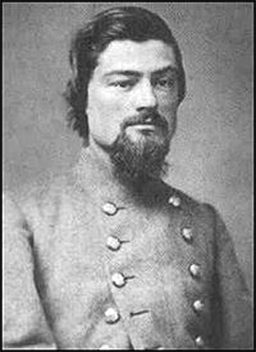|
Kentucky’s Civil War leaders…
Duke’s distinguished career was capped
by his Southern Experience writing
(EDITOR’S NOTE: This is the 13th in a series about Kentucky’s officers and battle leaders during the Civil War.)
Brig. Gen. Basil Wilson Duke had a distinguished career as a Confederate officer with Morgan’s Raiders, but his most outstanding achievements may have been as a prominent writer of the Southern Civil War experience.
The Georgetown native was editor of “Southern Bivouac” magazine and authored two heralded books, “The History of Morgan’s Cavalry,” and “Reminiscences of General Basil W. Duke.” Duke did not advocate slavery, but neither did he apologize for it. He felt it was good that it was abolished, but that Northern claims of excessive abuse of slaves was exaggerated.
Duke also founded what is now Louisville’s Filson Historical Society and wrote many of the organization's early papers.
He attended Georgetown and Centre Colleges before studying law at Transylvania College. After graduating in 1858, he practiced law in St. Louis.
Duke was active in the Missouri secessionist movement and moved to Lexington in April 1861 to marry Henrietta Hunt Morgan, sister of John Hunt Morgan. In October of that year, he enlisted in his brother-in-law’s command and soon attained the rank of colonel. He was the principal trainer for mounted combat for Morgan’s Raiders and was considered its key strategist.
Wounded at the Battle of Shiloh, he was captured in the Ohio raid of 1863 and was promoted to brigadier general in 1864 upon his release. At that time, he assumed command of Morgan’s Raiders as Morgan was killed at Greeneville, Tenn.
Duke later was with Confederate President Jefferson Davis until the commander-in-chief’s capture.
After the war, Duke lived in Louisville for most of his remaining life. He practiced law and served briefly in the Kentucky General Assembly and from 1875-80 was the Fifth Judicial District’s commonwealth attorney. In 1903, he was appointed commissioner of Shiloh National Military Park by President Theodore Roosevelt.
Duke, who died in 1916 at age 78, was highly respected by the soldiers he commanded and was described as “being steadfast during difficult moments of conflict” and as “a spit-and-polish officer.” At the time of his death, he was one of the last living, highest-ranking Confederates.
Following the death of his wife of 50 years in 1909, Duke lived with his daughter, Julia, and her family in Louisville’s Cherokee Park. He’s buried in the Hunt family park in the Lexington Cemetery.
|









